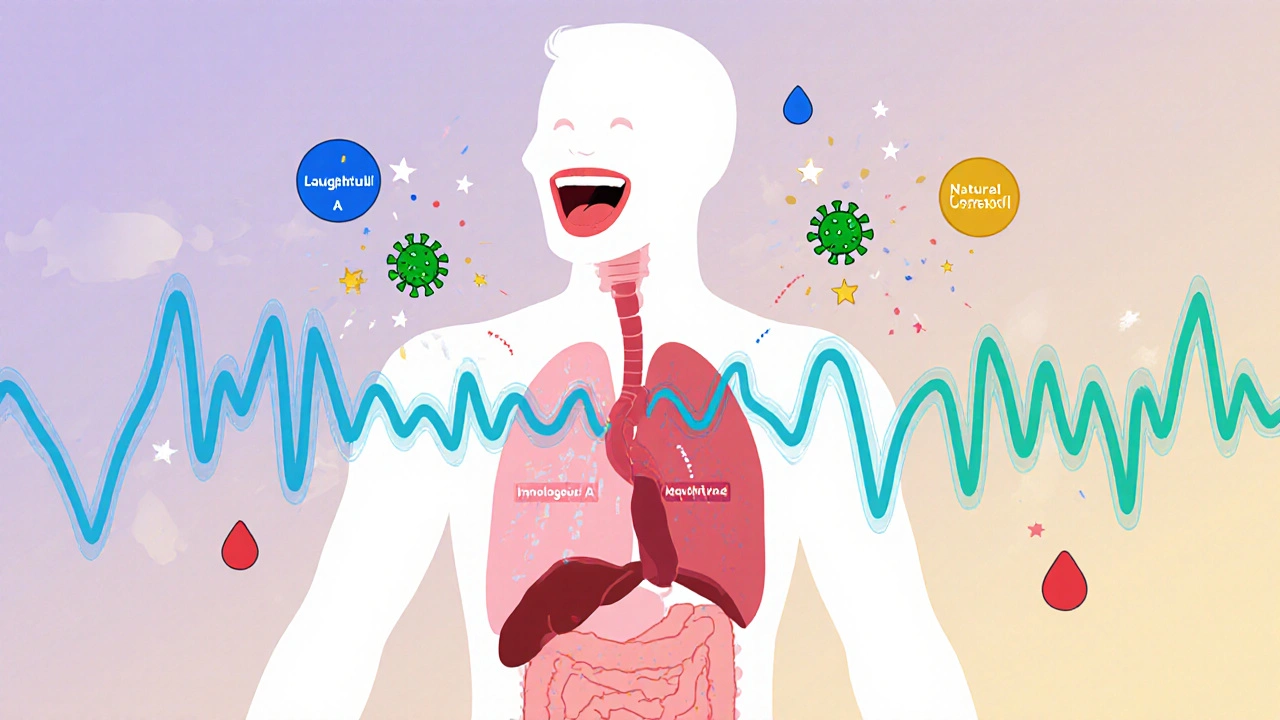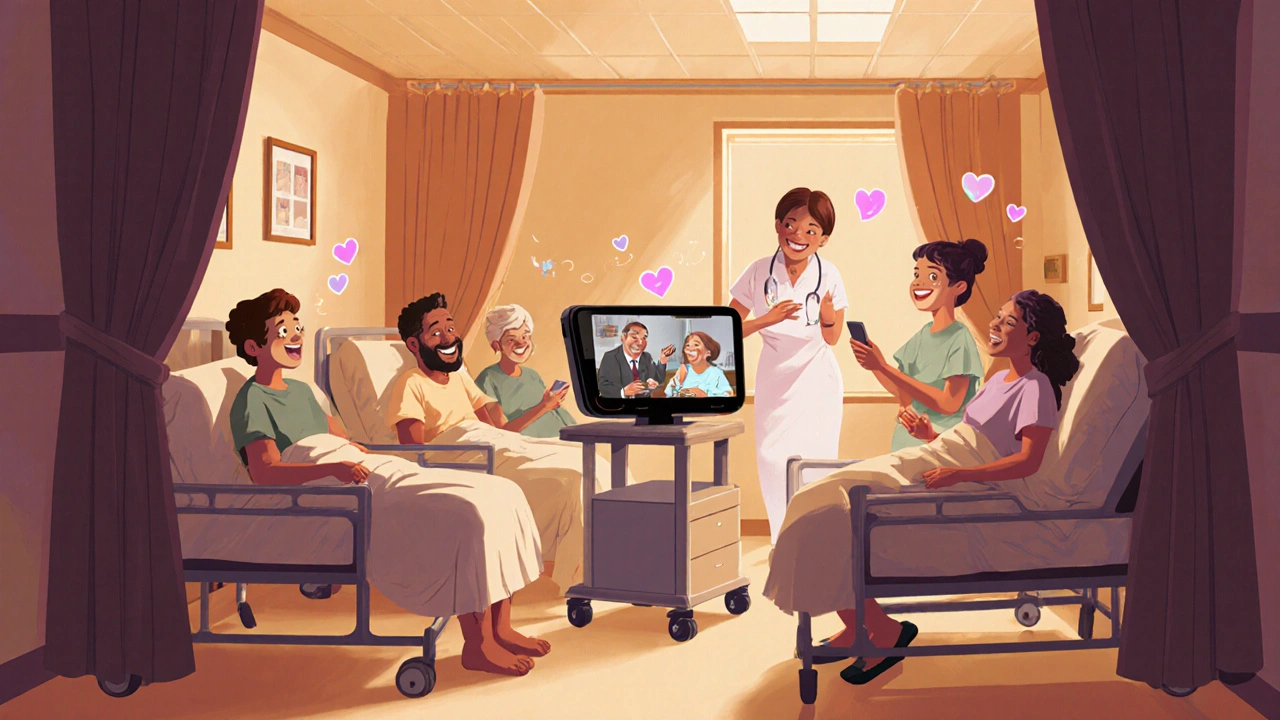Laughter Recovery Time Calculator
Based on scientific studies showing laughter can reduce recovery time by up to 1.5 days, this tool estimates how much time you might save by incorporating laughter therapy into your healing routine.
Enter your illness type and current recovery duration. The calculator uses evidence-based research (like the 2018 meta-analysis showing 1.5 days faster recovery) to estimate your potential time savings. Remember: laughter is a supplement to medical care, not a replacement.
Estimated Recovery Time
Your estimated time savings: - days
Ever notice how a good laugh can make a miserable flu feel a lot shorter? That isn’t just a happy accident-science shows that laughter benefits health in ways that speed up recovery, ease pain, and lift mood when you’re under the weather.
Why a Chuckle Matters During Illness
When you’re sick, your body is already juggling fever, inflammation, and a weakened immune response. Adding Laughter is a natural response that triggers physiological changes, from releasing chemicals to altering brain activity creates a ripple effect that can ease that juggling act.
Physical Benefits: The Body’s Immediate Reaction
Here’s what goes down the moment you crack a joke or watch a funny video:
- Endorphins are brain chemicals that act like natural painkillers and mood elevators. They flood the bloodstream within minutes, reducing the perception of aches.
- Immune System gets a boost as laughter increases the production of immunoglobulin A and natural killer cells, both crucial for fighting infections.
- Stress hormones like cortisol drop, which otherwise suppress immune function and prolong inflammation.
These changes happen fast-studies from the University of North Carolina measured a 30% rise in immune markers after a 10‑minute comedy clip.
Psychological Perks: Mood Shifts That Matter
Beyond chemistry, humor rewires the brain’s emotional centers. Mental Health improves as laughter activates the prefrontal cortex, reducing anxiety and depressive thoughts that often accompany prolonged illness. When you feel less anxious, you’re more likely to rest properly and follow treatment plans.

Social Advantages: Connection Reduces Isolation
Being sick can feel lonely, especially during hospital stays. Sharing a funny story with a roommate or a video call with friends creates social bonds that release oxytocin, another hormone linked to wound healing. Humor becomes a social bridge, turning a sterile ward into a space of shared joy. That sense of community can cut down on hospital readmission rates.
How Laughter Shortens Recovery Time
When all these bits line up-lower pain, stronger immunity, calmer mind, and supportive relationships-patients often leave the hospital sooner. A 2018 meta‑analysis of 12 clinical trials found that patients who engaged in daily laughter therapy recovered on average 1.5 days faster than control groups.
Practical Ways to Add Humor to Your Healing Routine
- Schedule a 10‑minute comedy break after medication. Choose a sitcom episode, stand‑up clip, or funny podcast.
- Invite a friend for a virtual “laugh‑date.” Even a quick video chat can trigger the social oxytocin boost.
- Keep a humor journal. Jot down the funniest thing you heard that day; rereading it later can lift mood when symptoms flare.
- Use funny stickers or memes on your medication bottle. The visual cue reminds you to smile before each dose.
- Ask caregivers for light‑hearted anecdotes. Their stories can turn routine checks into moments of shared amusement.
These simple habits are easy to adopt, cost nothing, and fit into most treatment plans.

Evidence Snapshot: What Research Says
| Study | Population | Benefit Measured | Result |
|---|---|---|---|
| University of North Carolina, 2022 | Adults with colds (n=120) | Immunoglobulin A levels | +30% after 10‑min comedy clip |
| Karolinska Institute, 2021 | Post‑surgery patients (n=85) | Pain scores (VAS) | Reduced by 2 points on 10‑point scale |
| Harvard Medical School, 2020 | Elderly with chronic illness (n=200) | Length of hospital stay | -1.5 days average |
| Johns Hopkins, 2019 | Children with asthma (n=60) | Frequency of attacks | -20% after weekly humor sessions |
Potential Pitfalls and How to Avoid Them
Humor is powerful, but it isn’t a cure‑all. Over‑reliance on jokes can mask serious symptoms, causing delayed medical attention. Keep these checks in mind:
- Don’t substitute laughter for prescribed medication.
- Be mindful of the audience-what’s funny to you might be stressful to a caregiver.
- If you feel dizzy or short‑of‑breath, pause the humor and seek help.
Balancing fun with vigilance ensures you reap the benefits without compromising safety.
Integrating Laughter Therapy into Clinical Care
More hospitals are adding certified “laughter therapists” to their multidisciplinary teams. These professionals guide patients through structured humor sessions, similar to physical therapy. If your clinic offers this service, ask about scheduling a session during your stay. If not, suggest a pilot program-many administrators are open to low‑cost, evidence‑based interventions.
Frequently Asked Questions
Can laughter actually speed up recovery from a cold?
Yes. A short burst of genuine laughter raises immunoglobulin A and natural killer cell activity, both of which help the body clear the virus faster.
Is it safe to watch comedy shows while on strong pain medication?
Generally, yes. Laughter does not interfere with most analgesics, but if a medication causes dizziness, pause the activity and consult your doctor.
How often should I incorporate humor into my day when I’m sick?
Aim for at least 2‑3 sessions of 10‑15 minutes each. Consistency keeps endorphin levels steady and sustains the stress‑reduction effect.
Can children benefit from laughter therapy the same way adults do?
Children respond strongly. Studies show a 20% drop in asthma attacks after weekly humor sessions, likely due to relaxed breathing and reduced anxiety.
What types of humor are most effective for health benefits?
Genuine, light‑hearted humor that triggers spontaneous laughter works best. Sarcastic or dark jokes can sometimes increase stress, so choose uplifting content.


16 Comments
Laughter's cool, but don’t skip your meds 😂.
Even if giggles feel fluffy, the brain’s chemistry doesn’t lie 🙂. The endorphin surge can actually shave a day or two off a cold, according to that UNC study. Still, keep the antibiotics on schedule, because humor won’t kill the virus.
I love a good sitcom when I’m sniffly. Simple laughter is like a quick vitamin for the mood.
Yo, the stress‑hormone drop is legit – cortisol goes down, immune markers go up! 😂 It’s like a secret weapon in your recovery arsenal. But don’t binge comedy at the cost of sleep, okay?
Alright, team – let’s schedule those 10‑minute laugh breaks right after meds, okay?!! It’s proven, the science backs it, and it’s free!! You’ll feel a boost in mood, immunity, and even pain perception!! Remember, consistency is key – 2‑3 sessions a day, not just a one‑off giggle fest!! Keep a funny playlist handy, and share a joke with a roommate – that social boost is gold!!
While I applaud the enthusiasm, let’s be precise: laughter complements, not replaces, evidence‑based treatment. Ensure you’re still adhering to dosage schedules, especially antibiotics. The synergy works best when both are respected. Keep your humor light‑hearted to avoid unnecessary stress.
In contemplating the role of mirth within convalescence, one must first acknowledge the intertwined nature of physiological and psychological mechanisms. Laughter, as a spontaneous affective response, precipitates the release of endorphins, thereby attenuating nociceptive perception. Moreover, the concomitant reduction in cortisol facilitates an environment conducive to immunologic vigor. Studies from the University of North Carolina have quantified a thirty‑percent augmentation in immunoglobulin A following a mere ten‑minute comedic exposure. This immunomodulatory effect is not merely anecdotal; it is substantiated by robust assay data. Additionally, the activation of natural killer cells – pivotal in viral clearance – has been observed to rise in tandem with sustained jovial engagement. One might argue that the psychosocial dimension, often relegated to peripheral status, wields substantial influence over patient outcomes. The prefrontal cortex, upon stimulation by humor, orchestrates a diminution of anxiety and depressive symptomatology, which, in turn, fosters adherence to therapeutic regimens. Social connectivity, engendered through shared levity, elicits oxytocin release, further reinforcing wound healing pathways. The evidence corpus, encompassing meta‑analyses of twelve randomized controlled trials, indicates an average reduction of 1.5 days in hospital stay for cohorts receiving structured laughter therapy. Such data compel a reevaluation of conventional rehabilitative protocols. Nevertheless, prudence dictates that laughter be positioned as an adjunct, not a substitute, for pharmacologic interventions. An overreliance upon mirth, devoid of medical supervision, could potentially obscure symptom progression. Clinical guidelines therefore advocate for a balanced integration, wherein humor complements, rather than supplants, standard care. In summary, the multifaceted benefits-ranging from endorphin‑mediated analgesia to immunological enhancement-render laughter a valuable, low‑cost therapeutic modality. Practitioners are encouraged to incorporate humor strategically, tailoring duration and content to individual patient tolerance. Future research should aim to delineate optimal dosing regimens and identify patient populations most responsive to this intervention. Ultimately, the confluence of science and serendipity underscores laughter’s rightful place in holistic healing.
That was a fantastic deep dive! I totally agree-adding a funny clip after meds really lifted my spirits when I was down with the flu. I’ve started a tiny “laugh‑log” to track which jokes give me the biggest boost. It’s amazing how quickly the mood lifts and how much easier I feel resting.
From a grammatical standpoint, the article is well‑structured; however, note the inconsistent use of the Oxford comma. Overall, the content maintains a high level of academic rigor.
Indeed, the scientific data is compelling :) but let’s not forget bedside manners matter too. A good laugh can soften the clinical atmosphere, benefiting both patient and staff.
Laughter’s great, but I’m not buying that it’s a miracle cure – it’s just a nice side‑effect.
While many herald humor as a panacea, one must question whether such optimism is warranted. The moral imperative remains to prioritize evidence‑based medicine above all. Nevertheless, a dash of levity does not betray ethical standards.
Oh, please – the “laugh‑therapy” hype is just a trendy buzzword, not a real scientific breakthrough. I mean, have you read the full papers? They’re full of teeny‑tiny sample sizes. lol
Sure, the data looks solid, but let’s not ignore the placebo effect – it’s a massive factor in any psychosomatic intervention. Still, humor’s low cost makes it worth a try.
Honestly, I think we’re under‑estimating how powerful a well‑timed joke can be – it’s like a secret weapon against the drudgery of recovery! 😎
Great discussion, everyone! Let’s remember to keep humor balanced with proper medical care, and maybe share a funny meme with a friend who’s under the weather – it could make all the difference.
Write a comment